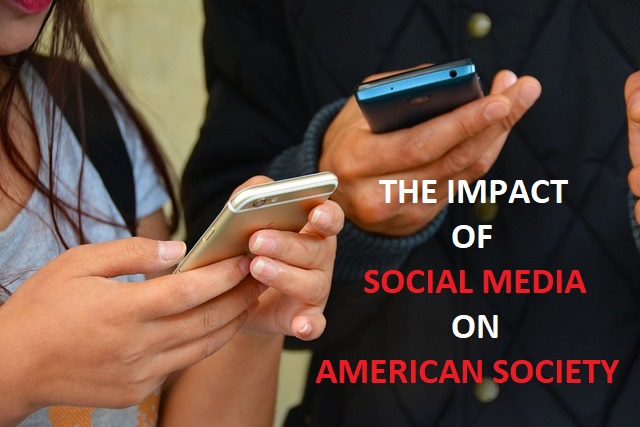Exploring the Impact of Social Media on American Society
Exploring Social Media’s impact on American society remains a complex and evolving phenomenon that requires careful consideration. Social media has significantly changed communication, information sharing, and interpersonal connections in American society. It has forged connections between people living apart, aided in the dissemination of news and information, and given people the freedom to express their thoughts and take part in activity. The proliferation of false information, the erosion of privacy, and potential harm to mental health are a few of the difficulties it has brought about. In this article, we will delve into the impact of social media on various aspects of American society.
Introduction:
In the past two decades, social media has emerged as a powerful force that has transformed the way we communicate, share information, and connect with one another. From Facebook and Twitter to Instagram and Snapchat, social media platforms have become an integral part of the daily lives of millions of Americans. While these platforms have undoubtedly brought people closer and facilitated the spread of information, they have also left an indelible mark on American society.
However, it has a greater impact than just connectivity because it has changed society norms and behaviors. A culture of comparison has emerged as a result of people continually seeking validation and acceptance through likes and comments on platforms like Facebook, Instagram, and Twitter where carefully selected images and narratives are constantly being presented. If one wants to maximize the former and minimize the latter in terms of how social media affects the evolution of American culture, it is imperative to achieve a balance between the two.
Exploring the Impact of Social Media on American Society
Communication and Relationships:
The area of communication and relationships is where social media has had one of the biggest effects on American society. These technologies, which enable quick and continuous communication, have revolutionized the way we engage with one another. The ease of social media communication has, however, also caused changes in the nature and breadth of our bonds. According to studies, excessive social media use can result in feelings of isolation, loneliness, and a drop in in-person contacts. To sustain good relationships, it’s crucial to create a balance between online and offline interactions.
How social media has affected Communication and Relationships in American society?
It is important to note that the impact of social media on communication and relationships is complex and varies among individuals.
While it offers new opportunities for connection, it is crucial to strike a balance between online and offline interactions to maintain healthy and fulfilling
relationships in American society.
Instant and Constant Communication
Social media platforms have provided a convenient and instantaneous means of communication.
People can connect with friends, family, and acquaintances regardless of geographical barriers, enabling real-time interactions and sharing of information.
Shifting Communication Patterns
The rise of social media has brought changes in communication patterns.
Many individuals now rely on social media messaging and comments for communication.
leading to a decline in face-to-face interactions and traditional forms of communication such as phone calls or in-person meetings.
Broadening Social Networks:
Social media has expanded individuals’ social networks by allowing them to connect with people from diverse backgrounds and interests.
This has facilitated the formation of new relationships, fostering connections that may not have been possible otherwise.
Impacts on Intimacy and Depth
While social media has enhanced the ability to connect with a wider audience, it has also raised concerns about the depth and quality of relationships.
Online interactions can lack the depth and intimacy of face-to-face communication, leading to potential challenges in establishing and maintaining
meaningful connections.
Influence on Relationship Dynamics
Social media’s influence on relationships extends beyond initial interactions.
It has affected romantic relationships, friendships, and familial bonds by introducing new dynamics.
For example, social media can exacerbate jealousy or create misunderstandings due to the perception of others’ lives based on carefully curated online
profiles.
Exploring the Impact of Social Media on American Society
Information Dissemination and News Consumption:
For many Americans, social networking sites have replaced traditional media as their main source of news and information. Through social networks, news stories—both accurate and false—can spread quickly, influencing social and political debate as well as public opinion. While having access to information has its benefits, it has also led to problems like the proliferation of fake news and echo chambers, where people are only exposed to material that supports their own ideas. People must be careful information consumers and actively seek out various viewpoints.
How Information Dissemination and News Consumption has affected the American society
Information dissemination and news consumption have undergone significant transformations with the advent of social media, profoundly impacting American society. Here are five key points highlighting its effects:
Rapid and Widespread Dissemination
Social media platforms have accelerated the spread of information.
Allowing news stories and content to reach a broader audience at an unprecedented speed.
This rapid dissemination has the potential to shape public opinion, influence social discourse, and drive the agenda on various issues.
Accessibility and Democratization
Social media has democratized news consumption by providing individuals with easy access to a wide range of news sources and perspectives.
Users can now customize their news feeds, curating content based on their interests and preferences.
This accessibility has empowered people to seek out alternative viewpoints and participate in discussions, challenging traditional media gatekeeping.
Challenges of Misinformation and Fake News
The rise of social media has also brought challenges in terms of misinformation and fake news.
The ease of content creation and sharing has facilitated the spread of inaccurate or misleading information.
Such information lead to public confusion and erosion of trust in traditional news sources.
Discerning the credibility and authenticity of information has become increasingly important for media consumers.
Formation of Echo Chambers
Social media algorithms often prioritize content based on users’ preferences, creating echo chambers where individuals are exposed mainly to ideas that reinforce their existing beliefs and perspectives.
This phenomenon can lead to polarization, as people may become isolated within their ideological bubbles, limiting exposure to diverse viewpoints and impeding constructive dialogue.
Impact on Journalism and News Industry
The rise of social media has disrupted the traditional business models of the news industry. News organizations have had to adapt to the changing landscape, relying more heavily on digital platforms and grappling with issues such as monetization, distribution, and maintaining editorial standards. The shift towards digital platforms has also impacted the job market for journalists, with implications for the quality and diversity of news coverage.
People must critically assess the information they read on social media, double-check their sources, and look for reputable news sources. Education in media literacy is crucial for giving people the knowledge and skills they need to successfully manage the intricacies of news consumption and information dissemination in the digital age.
Exploring the Impact of Social Media on American Society
Political Participation and Activism:
Social media has had a big impact on American political activism and participation.
It has given people a platform to voice their thoughts, launch grassroots movements, and gather supporters.
Just a few instances of how social media has aided in social and political change include the Arab Spring, Occupy Wall Street, and the Black Lives Matter
movement.
But it’s important to understand that social media activism has its limits since it frequently lacks the intensity and persistence required for lasting systemic change.
How Political Participation and Activism has affected the American society
Political participation and activism in American society have experienced significant transformations due to the emergence of social media.
Here are five key points highlighting their effects:
Amplified Voices and Grassroots Movements
Social media platforms have provided individuals with a powerful tool to amplify their voices and mobilize like-minded individuals around various social and
political causes.
It has democratized activism, enabling grassroots movements to gain visibility and influence public discourse on a scale previously unimaginable.
Rapid Spread of Information and Awareness
Social media has facilitated the rapid dissemination of information, allowing political movements and activists to raise awareness about their causes, share news, and organize events or protests.
This accelerated spread of information has led to increased engagement and participation in political issues across a wider audience.
Direct Interaction with Political Figures
Social media has bridged the gap between citizens and political figures. It provides a platform for direct interaction, enabling individuals to engage with policymakers, politicians, and government officials in real-time.
This direct communication has facilitated greater transparency, accountability, and responsiveness from political leaders.
Facilitation of Online Activism
Social media has expanded the possibilities for activism beyond physical demonstrations.
Online petitions, hashtag campaigns, and viral challenges have become popular methods of activism, enabling individuals to engage in advocacy from the
comfort of their own homes.
Online platforms have facilitated virtual communities and digital networks, fostering solidarity and collective action.
Challenges in Sustained Engagement and Depth
While social media has empowered individuals to participate in political discussions and express their opinions,
it also presents challenges in terms of sustaining engagement and depth of activism.
The ease of liking, sharing, or retweeting content can create a sense of superficial involvement, and sustained commitment to long-term systemic change
may require offline action and sustained efforts beyond social media platforms.
It is important to recognize that social media activism has its limitations, and offline engagement and civic participation remain vital components of effecting real change in American society.
Nonetheless, social media has played a significant role in shaping the landscape of political participation and activism, allowing individuals to mobilize, express their views, and exert influence on social and political issues.
Exploring the Impact of Social Media on American Society

Mental Health and Well-being:
Concerns concerning social media’s effects on mental health and wellbeing have been raised due to its widespread use. Excessive social media use has been linked to depressive, anxious, and poor self-esteem symptoms, especially among young people, according to studies.
Constantly being exposed to edited and filtered representations of other people’s life might engender feelings of inadequacy and contribute to a warped perception of reality.
Maintaining mental health in the digital age requires engaging in practices that promote digital well-being, such as setting boundaries, taking breaks, and concentrating on worthwhile offline activities.
How Mental Health and Well-being has affected the American society?
Social media’s impact on mental health and well-being in American society has been a topic of concern. Here are five key points highlighting its effects:
Comparison and Self-esteem
Social media platforms often showcase carefully curated versions of people’s lives, creating a distorted perception of reality.
This constant exposure to idealized images and lifestyles can contribute to feelings of inadequacy and negatively impact self-esteem, particularly among
young people.
Fear of Missing Out (FOMO)
Social media can amplify the fear of missing out on social events and experiences.
Seeing others’ highlight reels and exciting activities can lead to feelings of exclusion and a sense of being left out.
potentially triggering anxiety and a desire for constant engagement with social media platforms.
Cyberbullying and Online Harassment
Social media has provided a platform for cyberbullying and online harassment, which can have severe psychological effects on individuals.
The anonymity and distance offered by social media can embolden individuals to engage in harmful behavior, leading to increased instances of anxiety,
depression, and other mental health issues.
Addiction and Distraction
Social media can be addictive, consuming significant amounts of time and attention.
Excessive use can contribute to reduced productivity, increased stress, and difficulties in maintaining focus and concentration.
This addiction-like behavior can negatively impact mental well-being and overall quality of life.
Supportive Online Communities
On the other hand, social media has also facilitated the formation of supportive online communities focused on mental health, providing a platform for individuals to share experiences, seek advice, and find solace.
These communities have fostered empathy, understanding, and connection, offering valuable support to those experiencing mental health challenges.
Individuals must practice digital well-being, establish boundaries, and utilize social media with awareness and purpose.
To reduce the detrimental effects of social media on mental health in American society, it is crucial to raise awareness of mental health, encourage
pleasant online interactions, and seek support when necessary.
Exploring the Impact of Social Media on American Society
Privacy and Data Security:
The popularity of social media has also led to considerable worries about data security and privacy. These platforms allow for the collection, analysis, and exploitation of user-submitted personal data for targeted advertising and even political manipulation.
Strong privacy measures are required as a result of incidents like the Cambridge Analytica scandal, which have revealed the vulnerability of user data. People should exercise caution while disclosing personal information online and support stricter data protection regulations.
Social media platforms raise significant concerns regarding privacy and security in American society. Here are five major concerns related to this issue:
Data Collection and Tracking
Social media platforms collect vast amounts of personal data from users, including demographic information, interests, browsing habits, and social connections.
This data is often used for targeted advertising, but there are concerns about how extensively this information is tracked, stored, and potentially shared with third parties without users’ explicit consent. This leads to online fraud.
Privacy Breaches and Data Misuse
High-profile incidents, such as the Cambridge Analytica scandal, have exposed the vulnerabilities of social media platforms in safeguarding user data.
Data breaches can result in unauthorized access to personal information, potentially leading to identity theft, financial fraud, or other forms of cybercrime.
Moreover, there is a risk of data misuse for purposes beyond what users originally intended or expected.
Cyberbullying and Online Harassment
Social media platforms have become breeding grounds for cyberbullying and online harassment.
Anonymity and the ease of spreading content can embolden individuals to engage in harmful behavior, leading to emotional distress, reputational damage, and compromised mental well-being.
Addressing these concerns and creating safer online environments has become a pressing issue.
False Information and Misinformation
Social media platforms have been instrumental in the rapid dissemination of false information and misinformation, leading to potential harm to individuals, public perception, and democratic processes.
The spread of misinformation can erode trust in reliable sources of information and contribute to the polarization of society. Countering the proliferation of false information poses significant challenges.
Lack of User Control and Transparency
Users often have limited control over their personal data and how it is used by social media platforms.
The complex algorithms and opaque data practices of these platforms can make it difficult for users to understand the extent of data collection, the algorithms’ impact on content distribution, and the implications for their privacy.
Greater transparency and user control are needed to address these concerns.
These concerns highlight the need for robust privacy regulations, enhanced security measures, and user empowerment in terms of data privacy and online safety.
Balancing the benefits of social media with the protection of privacy and security is a critical challenge for American society in the digital age.
Conclusion:
Without a doubt, social media has had a significant impact on American society. Communication, information gathering, political discourse, and how we view ourselves and others have all changed as a result. Social media can be used for a variety of purposes, but it is important for users to use it ethically and critically. We can use social media to promote positive change and build a healthier digital society for everyone by being aware of the possible hazards and difficulties it presents.
Teenagers should be taught how to use social media responsibly, digital well-being should be encouraged, and open discussions about the dangers of excessive social media use should be encouraged. It’s critical to develop resiliency, strong offline interactions, and a balanced view of technology.
If we want to reduce the harmful effects of social media on teenagers in American society. A balanced use of social media is necessary to keep American culture functioning properly. Promote civic engagement, counteract misinformation, foster constructive dialogue, amplify marginalized voices, and advance varied perspectives.
It is important to note that achieving a balance in society is a collective effort, and social media can be a powerful tool in this process. However, responsible usage, critical thinking, and respectful engagement are key to maximizing the positive impact of social media on American society.
Project On Women’s Empowerment: Analyzing Women’s Participation and Representation in Politics





0 Comments